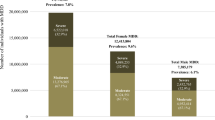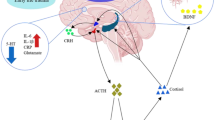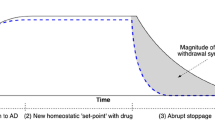Abstract
To investigate the association between baseline depressive symptoms and first fatal and non fatal coronary heart disease (CHD) and stroke in older adults, taking antidepressants and disability into account. In the Three City Study, a community-based prospective multicentric observational study cohort, 7,308 non-institutionalized men and women aged ≥65 years with no reported history of CHD, stroke or dementia, completed the 20-item Center for Epidemiologic Studies Depression Scale (CESD) questionnaire. First CHD and stroke events during follow-up were adjudicated by an independent expert committee. Hazard ratios (HRs) were estimated by Cox proportional hazard model. After a median follow-up of 5.3 years, 338 subjects had suffered a first non-fatal CHD or stroke event, and 82 had died from a CHD or stroke. After adjustment for study center, baseline socio-demographic characteristics, and conventional risk factors, depressive symptoms (CESD ≥ 16) were associated with fatal events only: fatal CHD plus stroke (HR = 2.50; 95 % CI 1.57–3.97), fatal CHD alone (n = 57; HR = 2.21 ; 95 %CI 1.27–3.87), and fatal stroke alone (n = 25; HR = 3.27; 95 % CI 1.42–7.52). These associations were even stronger in depressed subjects receiving antidepressants (HR = 4.17; 95 % CI 1.84–9.46) and in depressed subjects with impaired Instrumental Activities of Daily Living (HR = 8.93; 95 % CI 4.60–17.34). By contrast, there was no significant association with non fatal events (HR for non-fatal CHD or stroke = 0.94; 95 % CI 0.66–1.33). In non-institutionalized elderly subjects without overt CHD, stroke or dementia, depressive symptoms were selectively and robustly associated with first fatal CHD or stroke events.


Similar content being viewed by others
References
Nicholson A, Kuper H, Hemingway H. Depression as an aetiologic and prognostic factor in coronary heart disease: a meta-analysis of 6362 events among 146 538 participants in 54 observational studies. Eur Heart J. 2006;27:2763–74.
Empana JP, Jouven X, Lemaitre RN, et al. Clinical depression and risk of out-of-hospital cardiac arrest. Arch Intern Med. 2006;166:195–200.
Whang W, Kubzansky LD, Kawachi I, et al. Depression and risk of sudden cardiac death and coronary heart disease in women: results from the Nurses’ Health Study. J Am Coll Cardiol. 2009;53:950–8.
Larson SL, Owens PL, Ford D, et al. Depressive disorder, dysthymia, and risk of stroke: thirteen-year follow-up from the Baltimore epidemiologic catchment area study. Stroke. 2001;32:1979–83.
Ohira T, Iso H, Satoh S, et al. Prospective study of depressive symptoms and risk of stroke among Japanese. Stroke. 2001;32:903–8.
Jorm AF. The epidemiology of depressive status in the elderly: implications for recognition, intervention, and prevention. Soc Psychiatry Psychiatr Epidemiol. 1995;30:53–9.
Goldberg RJ, Yarzebski J, Lessard D, et al. A two-decades (1975 to 1995) long experience in the incidence, in-hospital and long-term case-fatality rates of acute myocardial infarction: a community-wide perspective. J Am Coll Cardiol. 1999;33:1533–9.
Ryan J, Carriere I, Ritchie K, et al. Late-life depression and mortality: influence of gender and antidepressant use. Br J Psychiatry. 2008;192:12–8.
Ariyo AA, Haan M, Tangen CM, et al. Depressive symptoms and risks of coronary heart disease and mortality in elderly Americans. Cardiovascular Health Study Collaborative Research Group. Circulation. 2000;102:1773–9.
Penninx BW, Guralnik JM, Mendes de Leon CF, et al. Cardiovascular events and mortality in newly and chronically depressed persons >70 years of age. Am J Cardiol. 1998;81:988–94.
Wassertheil-Smoller S, Applegate WB, Berge K, et al. Change in depression as a precursor of cardiovascular events. SHEP Cooperative Research Group (systolic hypertension in the elderly). Arch Intern Med. 1996;156:553–61.
Mendes de Leon CF, Krumholz HM, Seeman TS, et al. Depression and risk of coronary heart disease in elderly men and women: New Haven EPESE, 1982–1991. Established populations for the epidemiologic studies of the elderly. Arch Intern Med. 1998;158:2341–8.
Salaycik KJ, Kelly-Hayes M, Beiser A, et al. Depressive symptoms and risk of stroke: the Framingham Study. Stroke. 2007;38:16–21.
Bos MJ, Lindén T, Koudstaal PJ, et al. Depressive symptoms and risk of stroke: the Rotterdam Study. J Neurol Neurosurg Psychiatry. 2008;79:997–1001.
3C Study Group. Vascular factors and risk of dementia: design of the Three-City Study and baseline characteristics of the study population. Neuroepidemiology. 2003;22:316–25.
Empana JP, Zureik M, Gariepy J, et al. The metabolic syndrome and the carotid artery structure in noninstitutionalized elderly subjects: the three-city study. Stroke. 2007;38:893–9.
Radloff LS. The CES-D Scale: a self-report depression scale for research in the general population. Appl Psychol Meas. 1977;1:385–401.
Lawton MP, Brody EM. Assessment of older people: self-maintaining and instrumental activities of daily living. Gerontologist. 1969;9:179–86.
Straczek C, Ducimetiere P, Barberger-Gateau P, et al. Higher level of systemic C-reactive protein is independently predictive of coronary heart disease in older community-dwelling adults: the three-city study. J Am Geriatr Soc. 2010;58:129–35.
Bineau S, Dufouil C, Helmer C, et al. Framingham stroke risk function in a large population-based cohort of elderly people: the 3C study. Stroke. 2009;40:1564–70.
Horton NJ, Kleinman KP. Much ado about nothing: a comparison of missing data methods and software to fit incomplete data regression models. Am Stat. 2007;61:79–90.
Surtees PG, Wainwright NWJ, Luben RN, et al. Depression and ischemic heart disease mortality: evidence from the EPIC-Norfolk United Kingdom Prospective Cohort Study. Am J Psychiatry. 2008;165:515–23.
Pan A, Sun Q, Okereke OI, et al. Depression and risk of stroke morbidity and mortality: a meta-analysis and systematic review. JAMA. 2011;306:1241–9.
Carney RM, Blumenthal JA, Freedland KE, et al. Low heart rate variability and the effect of depression on post-myocardial infarction mortality. Arch Intern Med. 2005;165:1486–91.
Carney RM, Freedland KE, Miller GE, et al. Depression as a risk factor for cardiac mortality and morbidity: a review of potential mechanisms. J Psychosom Res. 2002;53:897–902.
Alexopoulos GS, Meyers BS, Young RC, et al. ‘Vascular depression’ hypothesis. Arch Gen Psychiatry. 1997;54:915–22.
Hippisley-Cox J, Pringle M, Hammersley V, et al. Antidepressants as risk factor for ischaemic heart disease: case-control study in primary care. BMJ. 2001;323:666–9.
Smoller JW, Allison M, Cochrane BB, et al. Antidepressant use and risk of incident cardiovascular morbidity and mortality among postmenopausal women in the Women’s Health Initiative study. Arch Intern Med. 2009;169:2128–39.
Gallo JJ, Bogner HR, Morales KH, et al. The effect of a primary care practice-based depression intervention on mortality in older adults: a randomized trial. Ann Intern Med. 2007;146:689–98.
Glassman AH, O’Connor CM, Califf RM, et al. Sertraline Antidepressant Heart Attack Randomized Trial (SADHEART) Group. Sertraline treatment of major depression in patients with acute MI or unstable angina. JAMA. 2002;288:701–9.
Berkman LF, Blumenthal J, Burg M, et al. Enhancing recovery in coronary heart disease patients investigators (ENRICHD). Effects of treating depression and low perceived social support on clinical events after myocardial infarction: the enhancing recovery in coronary heart disease patients (ENRICHD) randomized trial. JAMA. 2003;289:3106–16.
Linke SE, Rutledge T, Johnson BD, et al. Depressive symptom dimensions and cardiovascular prognosis among women with suspected myocardial ischemia: a report from the National Heart, Lung, and Blood Institute-sponsored Women’s Ischemia Syndrome Evaluation. Arch Gen Psychiatry. 2009;66:499–507.
Acknowledgments
The Three City Study was conducted under a partnership agreement between the Institut National de la Santé et de la Recherche Médicale (INSERM), the Victor Segalen–Bordeaux II University, and Sanofi-Aventis. The Fondation pour la Recherche Médicale financed the preparation and initiation of the study. The Three City Study was also supported by the Caisse Nationale d’Assurance Maladie des Travailleurs Salariés, the Direction Générale de la Santé, the MGEN, the Institut de la Longévité, the Regional Councils of Aquitaine and Bourgogne, the Fondation de France and the Ministry of Research–INSERM Program “Cohortes et collections de données biologiques.” The funding sources had no role in the study design; the collection, analysis and interpretation of data; in the writing of the report; and in the decision to submit the article for publication.
Conflict of interest
Dr. Tzourio serves on scientific advisory boards for Merck Sharp & Dohme and the Fondation Plan Alzheimer, serves on the editorial boards of Neuroepidemiology and the Journal of Hypertension, and receives research support from the Agence Nationale de la Recherche and Fondation Plan Alzheimer. Dr. Empana has received consultancy honoraria from Lundbeck and speaker honoraria from Pfizer.
Author information
Authors and Affiliations
Corresponding authors
Rights and permissions
About this article
Cite this article
Péquignot, R., Tzourio, C., Péres, K. et al. Depressive symptoms, antidepressants and disability and future coronary heart disease and stroke events in older adults: the Three City Study. Eur J Epidemiol 28, 249–256 (2013). https://doi.org/10.1007/s10654-013-9765-3
Received:
Accepted:
Published:
Issue Date:
DOI: https://doi.org/10.1007/s10654-013-9765-3




